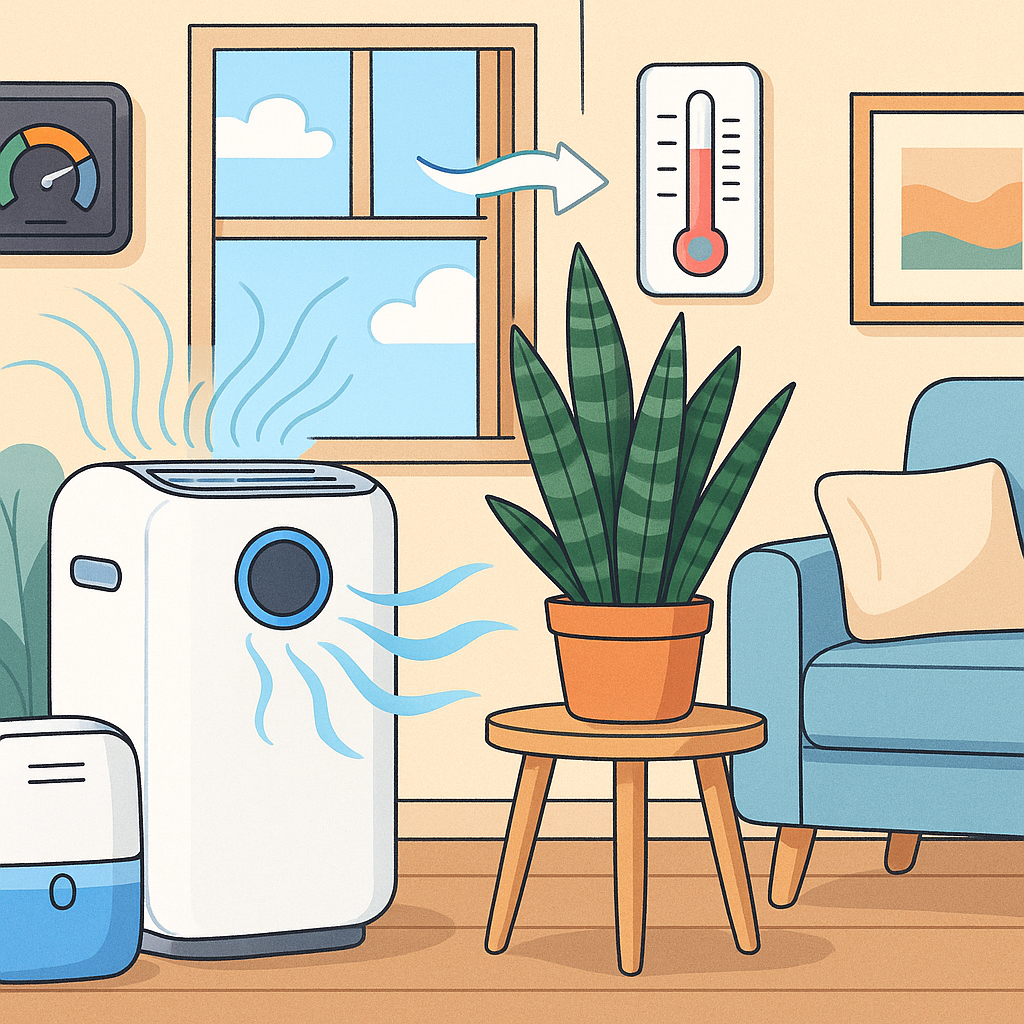Indoor air pollution can be up to five times worse than outdoor air, leading to health issues like asthma, allergies, and fatigue. With emerging trends and technologies, there are more ways to improve your home’s air quality is more achievable than ever.

1. Upgrade to Smart Air Purifiers
Modern air purifiers equipped with HEPA filters and smart sensors can detect and eliminate pollutants like dust, pollen, and smoke particles. Some models adjust settings automatically based on air quality readings, ensuring optimal performance. Regular use can significantly reduce respiratory issues and improve sleep quality.Homes and Gardens+1Homes and Gardens+1
2. Maintain Optimal Humidity Levels
Keeping indoor humidity between 30% and 50% prevents mold growth and reduces dust mites. Using humidifiers or dehumidifiers as needed can help maintain this balance. Be cautious, as excessive humidity can exacerbate allergies and asthma symptoms.Verywell Health+1EnviroAire IAQ+1EnviroAire IAQ+1The Irish Sun+1
3. Enhance Ventilation
Proper ventilation is crucial for diluting indoor pollutants. Utilize exhaust fans in kitchens and bathrooms, and consider installing energy recovery ventilators (ERVs) to exchange stale indoor air with fresh outdoor air efficiently.EnviroAire IAQ
4. Incorporate Air-Purifying Plants
Certain houseplants, like snake plants and peace lilies, can absorb toxins and improve air quality. They also add aesthetic value to your home. However, be aware of any plant-related allergies and ensure proper care to prevent mold growth in soil.
5. Regularly Replace HVAC Filters
Changing your HVAC system’s filters every 60-90 days ensures efficient operation and cleaner air. Consider using high-efficiency particulate air (HEPA) filters for better pollutant removal.
6. Limit Use of Volatile Organic Compounds (VOCs)
VOCs are emitted by various household products like paints, cleaners, and aerosols. Opt for low-VOC or VOC-free products to minimize indoor air pollution. Proper storage and usage can further reduce exposure.
7. Monitor Indoor Air Quality
Investing in an indoor air quality monitor can provide real-time data on pollutants, humidity, and temperature. This information helps in making informed decisions to improve air quality, such as adjusting ventilation or identifying pollution sources.
References:
- U.S. Environmental Protection Agency. (n.d.). Indoor Air Quality. Retrieved from https://www.epa.gov/indoor-air-quality-iaqUS EPA+2US EPA+2US EPA+2
- Centers for Disease Control and Prevention. (n.d.). Humidifier Use and Indoor Air Quality. Retrieved from https://www.cdc.gov/nceh/features/humidifier-use/index.html
- NASA Clean Air Study. (1989). Interior Landscape Plants for Indoor Air Pollution Abatement. Retrieved from https://ntrs.nasa.gov/citations/19930073077
- American Lung Association. (n.d.). Air Filters. Retrieved from https://www.lung.org/clean-air/at-home/indoor-air-pollutants/air-filters
- Consumer Product Safety Commission. (n.d.). Volatile Organic Compounds’ Impact on Indoor Air Quality. Retrieved from https://www.cpsc.gov/s3fs-public/blkmedia.pdf
- AirNow. (n.d.). Air Quality Index (AQI) Basics. Retrieved from https://www.airnow.gov/aqi/aqi-basics/
- National Institute of Environmental Health Sciences. (n.d.). Indoor Air Quality. Retrieved from https://www.niehs.nih.gov/health/topics/agents/indoor-air/index.cfmNIEHS
- Better Homes & Gardens. (2025). Slow Decorating Is the Sustainable Home Trend Designers Want You to Start Using. Retrieved from https://www.bhg.com/slow-decorating-home-trend-11734024bhg.com
- The Guardian. (2025). Toxic wildfire pollution infiltrates homes of 1bn people a year, study finds. Retrieved from https://www.theguardian.com/environment/2025/may/14/toxic-wildfire-pollution-infiltrates-homes-of-1bn-people-a-year-study-findstheguardian.com
- Verywell Health. (2025). Do Humidifiers Help With Allergies? Retrieved from https://www.verywellhealth.com/do-humidifiers-help-with-allergies-11716673









